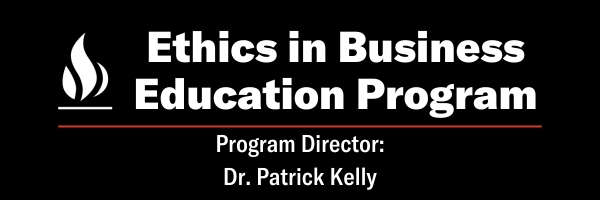Ethics in Business Education Program
EDUCATION WITH INTEGRITY
Ethics in Business Education Program Goals
- To enhance the ethics education of business students by building on concepts learned in the Development of Western Civilization (DWC) Program.
- Support student co-curricular activities, including case competitions held at other universities as well as Providence College.
- Support faculty efforts to address business ethics in their courses.
Ethics Competitions
Our student co-curricular activities have focused on supporting student involvement in ethics case competitions.
The Providence College School of Business hosts the Michael Smith Business Ethics Case Competition, which includes participants from other higher education institutions around the world. Additionally, Providence College provides the opportunity for students to partake in the annual PC Business Ethics case competition, an internal case competition. We also support student participation in a variety of external competitions such as the Eller Case Competition at the University of Arizona and the Berg Cup Case Competition at the University of Pittsburgh. Learn more about the Berg Cup Competition and the winning 2016 Providence College team!
Ethics and Western Civ
Building on the Development of Western Civilization Program
After a review of topics addressed in the Development of Western Civilization (DWC) Program, we identified themes related to ethics. These themes are:
Virtue Ethics focuses on developing good habits or traits of character. This includes both cardinal virtues identified by Aristotle and Plato (practical wisdom, courage, temperance, and justice), and the Christian virtues of the Catholic and Dominican tradition modeled by Jesus (humility, forgiveness, service, compassion, solidarity, etc.).
Deontology focuses on the rights of individuals and the duties that are associated with these rights. Immanuel Kant argued that each person had dignity and should be treated as an end and not as a means to an end. Kant also provided the categorical imperative: “Act only according to that maxim by which you can at the same time will that it should become a universal law.”
Utilitarianism focuses on the work of John Stuart Mill and Jeremy Bentham which calculates the greatest good by the consequences of actions. One should choose the action that provides the sum total of the greatest good for the greatest number.
Justice focuses on issues of fairness and the theories of Cicero, who held that justice is to give what is due. There are different types of justice:
- Procedural justice – refers to fair processes for all parties involved.
- Distributive justice – refers to the fairness associated with how benefits and burdens are distributed in society.
- Compensatory justice – refers to the fair compensation to those who are injured by those who have injured them.
- Retributive justice – refers to the extent that punishments are fair and just.
Catholic Social Teaching sees business as a vocation to serve genuine human needs and to advance the common good guided by the social ethical principles (human dignity, solidarity, the dignity of work, rights of workers, rights and responsibilities, and care for God’s creations), illuminated by the Gospels. (U.S. Conference of Catholic Bishops).
Ethics Program News and Stories
Patrick Kelly
Michael A. Ruane Endowed Professor & Director, Ethics in Business Education Program
Faculty Profile
Ryan Center for Business Studies 348
401.865.1266
pkelly@providence.edu






